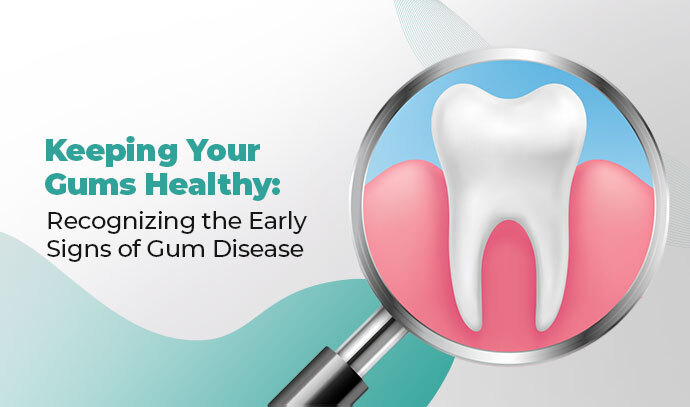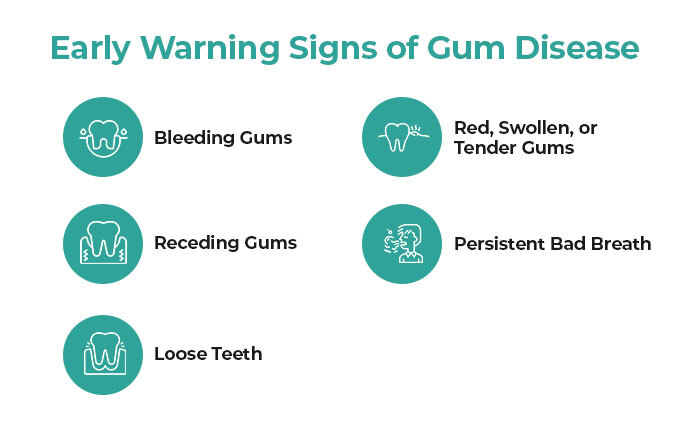
Keeping Your Gums Healthy: Recognizing the Early Signs of Gum Disease
Our gums provide critical support for our teeth and overall oral health. When gum tissue becomes inflamed or infected, it can lead to severe issues like tooth loss and increased disease risk. That’s why noticing early signs of gum disease and seeking prompt treatment is important. This blog will explore common symptoms that may indicate gum disease is developing. We will look at potential causes and proven treatment options to stop gum disease from advancing. Know how to protect your gums and when to contact a periodontics specialist. Healthy gums lead to a vibrant smile and reduced dental problems.
Understanding Gum Diseases
Gum disease, or periodontal disease, is a condition that affects the tissues supporting and surrounding the teeth. It’s primarily caused by the buildup of plaque, a sticky film of bacteria that forms on the teeth. If not removed through daily brushing and flossing, plaque can harden into tartar, exacerbating gum inflammation and leading to more severe periodontal disease.

Early Warning Signs
Recognizing the early signs of gum disease can significantly enhance your chances of reversing damage and preventing further progression. Here are some key indicators to watch out for:
Bleeding Gums: One of the most common and noticeable signs. If your gums bleed during brushing or flossing, it’s time to pay attention.
Red, Swollen, or Tender Gums: Healthy gums are firm and pale pink. If they’re red, swollen, or tender, it could be an early sign of gum disease.
Receding Gums: If your teeth appear longer than usual, it might be due to your gums reducing, a sign that periodontal disease is advancing.
Persistent Bad Breath: Caused by the bacteria in plaque, persistent bad breath or a bad taste in your mouth can indicate gum disease.
Loose Teeth: In advanced stages, the bones supporting your teeth can be affected, leading to tooth mobility.
Effective Gum Disease Treatments
Gum disease treatment varies depending on the severity of the condition but typically focuses on controlling the infection and restoring gum health. Here’s how Elite Dental Care approaches periodontics treatment in Kochi:
Professional Cleaning: The first step in treating gum disease involves removing plaque and tartar buildup through professional cleaning. This includes scaling and root planing, where plaque and tartar from above and below the gum line are scraped away, and rough spots on the tooth root are made smooth.
Medication: Sometimes, medication may be used alongside cleaning to reduce pocket depth and combat bacteria.
Advanced Treatments: For more severe cases, surgical treatments such as flap surgery (pocket reduction surgery) or bone and tissue grafts may be necessary to restore damaged tissues.
Protect Your Gums with Preventative Care
Preventing gum disease from developing is the ideal way to maintain healthy gums for life. With proactive daily oral hygiene and regular professional cleanings, you can keep your gums plaque-free and in optimal shape.
Brush Properly: Brush teeth gently twice a day (morning and night) for 2 minutes each time. Use a soft-bristled toothbrush and antibacterial toothpaste. Angle brush bristles 45 degrees towards your gums and sweeps in short strokes. Avoid scrubbing hard, which can erode gums. Don’t forget to brush your tongue, which harbors bacteria.
Floss Thoroughly: Floss at least once per day, preferably at night, using a back-and-forth motion. Curve floss around each tooth and under the gumline. Take your time, and don’t snap or force floss, which can damage gums. Use a floss threader if you have trouble maneuvering floss between tight teeth.
Rinse with Mouthwash: Swish daily with an antiseptic mouthwash like Listerine to reduce plaque bacteria. Apply mouthwash after brushing and flossing to reach the cleaned areas. Choose a mouthwash formulated for gum health and follow instructions. Don’t eat or drink for 30 minutes after using to allow full antiseptic effect.
Optimize Your Diet: To strengthen gums, consume a balanced diet rich in nutrients like Vitamin C and calcium. Limit sugary and acidic foods that promote plaque bacteria growth. Stay hydrated by drinking plenty of water to keep your mouth moist. Avoid excessive coffee, tea, and alcohol that can dehydrate oral tissues.
Don’t Smoke: Smoking increases gum disease risk by restricting oxygen-rich blood flow to the gums. Quitting smoking significantly lowers your risk of gum problems and improves healing. Talk to your doctor about smoking cessation programs and nicotine replacement options.
See Your Dentist Regularly: Get a professional cleaning and exam every six months to catch issues early. Have your dentist evaluate symptoms like swelling, bleeding, or receding gums. Discuss any health conditions or medications impacting your oral health. If you are searching for ‘periodontist near me’, Elite Dental Care is here to help.
Conclusion
Gums keep our teeth securely in place, protecting the jawbone and providing a barrier against bacteria entering our bloodstream. When gums recede due to disease, our teeth become loose, bone deteriorates, and we face a higher risk of problems. By identifying gum disease in early stages, we can take action to restore gum health before extensive damage occurs. Elite Dental Care is a best periodontics clinic in Kochi that provides comprehensive, compassionate care for all your periodontal needs. With our expert team, advanced treatments, and patient-centered approach, we are dedicated to ensuring that your journey toward healthy gums is smooth, effective, and tailored to your unique situation.
FAQs
How can I tell if I have gum disease?
Ans. If you notice your gums are bleeding, swollen, or tender when you brush or floss or have persistent bad breath, these could be early signs of gum disease. Visiting Elite Dental Care for a check-up is important if you experience any of these symptoms.
Can gum disease be cured entirely?
Ans. In its early stages, gum disease can often be reversed with proper dental care and oral hygiene practices. For more advanced cases, treatments at Elite Dental Care can effectively manage the condition, preventing further damage and restoring gum health.
What happens if gum disease is left untreated?
Ans. Untreated gum disease can progress to periodontitis, leading to receding gums, loss of bone around the teeth, and eventually, tooth loss. It can also increase the risk of other health issues, such as heart disease and diabetes.
Why should I choose Elite Dental Care for my gum disease treatment?
Ans. Elite Dental Care offers expert periodontists, advanced technology, and a patient-centered approach to treatment. We provide personalized care tailored to your needs, ensuring the best possible outcomes for your gum health.
Have Dental Problem : Call us
CALICUT: +91 9745 072 555,
KOCHI: +91 9567 124 888
KANNUR: +91 9645874777
or make an Appointment
Take a smiling selfie and we'll Simulate your new smile See What Invisalign treatment could do for you!




